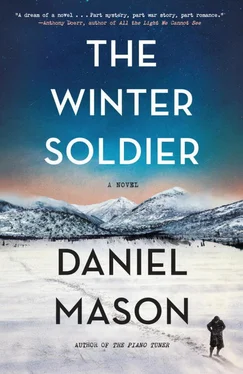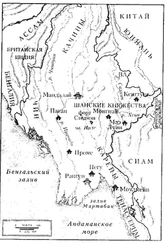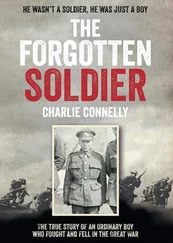Daniel Mason
THE WINTER SOLDIER
Certain affections have an unfortunate destiny.
—André Léri, 1918,
Commotions et émotions de guerre
Northern Hungary,
February 1915
They were five hours east of Debrecen when the train came to a halt before the station on the empty plain.
There was no announcement, not even a whistle. Were it not for the snow-draped placard, he wouldn’t have known they had arrived. Hastening, afraid he would miss the stop, he gathered his bag, his coat, his saber, pushing his way out through the men who filled the corridor of the train. He was the only passenger to descend. Farther down the line, porters unloaded a pair of crates onto the snow before jumping back on board, slapping warmth into their hands. Then the carriages began to move, chains clanking, stirring his greatcoat and swirling snow around his knees.
He found the hussar in the station house, with the horses brought in from the cold. Their ears flicked against the low ceiling, their long faces overhanging a bench where three peasant women sat, hands clasped over their swaddled bellies like fat men content after a meal. Feet dangling just above the floor. Woman, horse, woman, horse, woman. The hussar stood without speaking. Back in Vienna, Lucius had seen regiments on parade with their plumes and colored sashes, but this man was dressed in a thick grey coat, with a cap of worn, patched fur. He motioned Lucius forward and handed him the reins of one of the horses before he led the other outside, its tail whisking across the women as it passed beneath the Habsburg double-headed eagle on the door.
Lucius tugged on the reins, but his horse resisted. He stroked her neck with the back of one hand—the broken one—while he pulled with the other. “Come,” he whispered, first in German, then in Polish, as her back hooves broke from the ice and frozen dung. To the hussar at the door, he said, “You’ve been waiting long.”
It was the last thing he said. Outside, the hussar lowered a leather mask, cut with slits for eyes and nostrils, and heaved himself onto his horse. Lucius followed, rucksack on his shoulders, struggling to wrap his scarf over his face. From inside the station house, the three old women watched them until the hussar wheeled his horse around and kicked the door shut. Your sons aren’t coming, Lucius wanted to tell them. Not in any state you’d wish to see. There was scarcely a man with two legs who wasn’t trying to lift the Russian siege of Przemyśl now.
Without a word the hussar began to ride north at a trot, his long rifle across his saddle, his saber on his waist. Lucius looked back to the railway, but the train had vanished. Snowflakes had begun to cover the track.
He followed. His horse’s hooves clattered on the frozen earth. The sky was grey, and in the distance, he could see the mountains rising up into the storm. Somewhere, there, was Lemnowice, and the regimental hospital of the Third Army where he was to serve.
* * *
He was twenty-two years old, restless, resentful of hierarchy, impatient for his training to come to an end. For three years he had studied alone in the libraries, devoted to medicine with a monastic severity. Onion paper feathered the margins of his textbooks, licked and pasted in by hand. In the great halls, on gleaming lantern slides, he’d seen the ravages of typhus, scarlatina, lupus, pest. He had memorized the signs of cocainism and hysteria, knew that the breath of cyanide poisoning smelled of almonds, and the murmur of a narrowed aortic valve could be heard in the neck. In tie and jacket, freshly ironed for the day, he’d spent hours staring down from the dizzying heights of the surgery theater, straining his neck for a line-of-sight through the restless coveys of his classmates, over the neatly combed heads of senior students, over the junior professors, the surgeon’s assistants, across the surgical drape, and down into the cut. By the time war was declared, he was dreaming nightly of the theater: long, demanding dreams in which he extracted impossible organs, half-man, half-pig. (It was on butcher’s scraps he practiced.) One night, dreaming of an extraction of the gallbladder, he had such a distinct impression of the wet, leaden warmth of the liver, that he woke certain he could carry out the surgery alone.
If his devotion was total, its origin remained a mystery. As a child, he had gazed with wonder at the wax cadavers at the Anatomical Museum, but so had his three brothers, and not one of them had turned to Hippocrates’s art. There were no doctors in his line, not among the Krzelewskis of southern Poland, and certainly not among his mother’s people. At times, cornered by some peahen at one of her unbearable receptions, he endured a condescending speech on how medicine was a noble calling, that one day he would be rewarded for his kindness. But kindness was not interesting to him. His best answer to what drove his endless hours of study was the joy of study itself. He was not a person drawn to religious devotion, but it was in religion that he found the words: revelation, epiphany, the miracle of God’s creations, and by extension, the miracle of how God’s creations failed.
Study itself: this was, at least, the answer that he gave in his moments of greatest exultation. But there was another reason he had turned to medicine, one he only considered later in the hours of his doubt. Of the two other students he could call his friends, Feuermann was the son of a tailor, while Kaminski, who wore empty spectacles just to look older, was on a scholarship from the Sisters of Mercy. Although they never spoke of it, Lucius knew they all had come to medicine for its promise of social mobility. For Feuermann and Kaminski this meant up: from the slums of Leopoldstadt and the charity school. For Lucius, whose father came from an ancient Polish family that claimed descent from Japheth, son of Noah (yes, that Noah), and in whose mother’s veins coursed the same cerulean blood as that Great Liberator of Vienna and Savior of Western Civilization, Jan Sobieski, King of Poland, Grand Duke of Lithuania, Ruthenia, Prussia, Masovia, Samogitia, Livonia, Smolensk, Kiev, Volhynia, etc., etc.—for Lucius, such mobility meant not up, but out.
No, from the beginning he hadn’t belonged among them, an accidental sixth child born years after the doctor told his mother she couldn’t conceive again. Were he not the spitting image of his father—tall and big-pawed, with skin pale as alabaster, a shock of blond hair fit for an Icelander, and old man’s ducktail eyebrows even as a little boy—he might have wondered if he was another’s child. But the flushes of ruddiness that gave his father the hale glow of a knight who has just removed his jouster’s helmet, in Lucius looked more like blotches of an embarrassed blush. Watching his brothers and sisters glide through his mother’s receptions, he could never understand their ease, their grace, their force. No matter what he tried—holding a stone in his pocket as a reminder to smile, writing lists of “Chatting Topics”—spontaneity eluded him. Before the parties, he would slink through the salon, attaching to each piece of artwork an idea for conversation: when he saw the portrait of Sobieski he was to speak of holidays; the bust of Chopin should spur him to ask about his guest. Yet, no matter how he prepared, it happened: there would be a moment, a pause—just a second—just a catch—before he—spoke. He could move easily through the shifting choreography of soft gowns and pressed field marshal trousers. But the moment that he approached a cluster of other children, their laughter stopped.
Читать дальше














